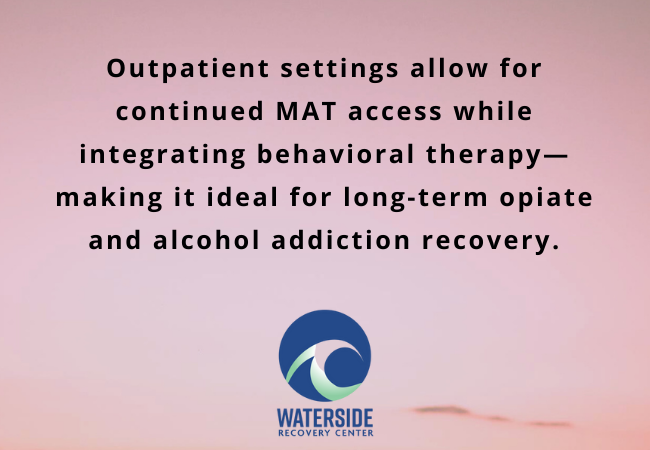Long-term recovery is not a destination but a journey—one that requires consistent support, structure, and the opportunity to grow within the context of everyday life. For many individuals navigating substance use and mental health disorders, outpatient treatment provides a flexible and empowering framework that encourages sustainable healing. Rather than isolating individuals from their responsibilities, outpatient care integrates recovery with real-world living.
Outpatient treatment serves as a bridge between intensive care and independent recovery. It fosters skill development, builds community support, and strengthens coping strategies—all while allowing individuals to continue living at home, managing work or school, and maintaining essential relationships. At Waterside Recovery Center, outpatient care is tailored to help individuals find balance, empowerment, and the tools necessary to build a life free from addiction.
Redefining What Recovery Looks Like
Traditional views of addiction treatment often revolve around 30-day inpatient programs, but recovery doesn’t end after a month—it’s a lifelong process. Outpatient treatment allows individuals to receive ongoing care as they transition back into their communities. Whether someone has recently completed a residential program or is starting their recovery journey in an outpatient setting, this level of care offers clinical structure while reinforcing autonomy.
Participating in an Outpatient Treatment Program in Massachusetts enables clients to maintain consistency in treatment without putting their lives on hold. With flexible scheduling and personalized approaches, outpatient care meets people where they are—emotionally, logistically, and clinically.
This model empowers individuals to apply the coping skills and therapeutic techniques they’ve learned in real-time, adapting their recovery to the nuances of everyday stressors and situations.
Continuity of Care and Skill Reinforcement
Recovery doesn’t unfold in a vacuum—it’s shaped by our interactions, environments, and inner narratives. The strength of outpatient treatment lies in its ability to offer continuity. Clients remain engaged in structured therapeutic environments, even after completing higher levels of care. This extended connection to therapy and clinical guidance helps prevent relapse, reinforce healthy behaviors, and build self-awareness.
A Day Treatment Program in Massachusetts, for example, typically involves several hours of therapy during the day, with clients returning home each evening. This setup encourages consistent therapeutic engagement while giving individuals the opportunity to practice what they’ve learned in their home environments. The reinforcement of emotional regulation, communication skills, and boundary-setting is a key component of long-term success.
These programs often incorporate a mix of individual counseling, group therapy, and psychoeducation, allowing clients to deepen their understanding of their triggers and develop strategies for managing them.
Applying Recovery Tools in Real Life
Perhaps the greatest strength of outpatient care is the opportunity it provides for immediate application of recovery skills. In residential programs, clients often feel safe and supported—but removed from the pressures of daily life. Once they return home, they may struggle to adjust. Outpatient programs minimize this disconnection by allowing participants to experience and navigate real-world challenges while still receiving clinical support.
For instance, someone attending an Afternoon Treatment Program in Massachusetts might participate in therapy after work, processing stressors from their day in real time. This dynamic allows for quicker identification of high-risk situations and gives the treatment team insights into how each client is functioning outside the clinical environment.
This model also creates an open feedback loop between life and treatment. As individuals face difficulties in their relationships, workplaces, or communities, they bring those experiences into therapy. These real-time insights enhance the therapeutic process and allow for more personalized, relevant interventions.
Cultivating a Strong Support Network
Support is the backbone of any successful recovery journey. Outpatient care not only helps individuals build clinical connections, but also encourages the development of peer and family support systems. Through group therapy and community-building activities, clients learn that they are not alone in their struggles.
Many Addiction Therapy Programs in Massachusetts incorporate peer-led groups, alumni support systems, and family counseling as core components. These connections help reduce the sense of isolation that can trigger relapse and promote a sense of belonging. When individuals know they are supported—not just by clinicians but by a wider recovery community—they are more likely to stay committed to their goals.
Furthermore, by remaining in their home environments, clients have the chance to repair and strengthen relationships with family and friends. With the guidance of counselors, they can navigate difficult conversations, establish boundaries, and foster mutual understanding.
Flexibility and Individualized Care
No two recovery journeys look the same. Outpatient treatment thrives on this reality, offering a range of care levels that accommodate varying clinical needs, schedules, and lifestyles. From early recovery to maintenance and relapse prevention, outpatient programs can be adjusted to meet the evolving needs of each person.
A Partial Hospitalization Program in Massachusetts is ideal for individuals who require more structure than standard outpatient therapy but don’t need 24-hour supervision. These programs offer intensive support during the day while allowing participants to live at home. It’s a model that’s especially beneficial for those who are transitioning from inpatient care or who are at a higher risk of relapse.
On the other hand, individuals with stronger support systems and more stable recovery histories may thrive in a less intensive outpatient format. The key is that the level of care aligns with each client’s unique challenges, strengths, and goals.
This personalized approach allows individuals to grow at their own pace, moving between levels of care as needed rather than following a rigid, one-size-fits-all model.
Navigating Triggers in a Real-World Context
One of the most difficult aspects of long-term recovery is navigating the multitude of triggers that exist in everyday life—stress, conflict, boredom, or social pressure. Outpatient treatment allows clients to identify and manage these triggers while they’re occurring, not after the fact.
This real-time exposure, coupled with clinical guidance, is what makes outpatient care so effective for long-term success. Rather than waiting for a crisis to seek help, individuals in outpatient programs are already embedded in a support system that encourages proactive coping.

Clients enrolled in an Addiction Treatment Center in Massachusetts benefit from immediate access to therapeutic resources, even as they go about their daily routines. This accessibility reduces the risk of relapse and builds a sense of security, knowing that support is always within reach.
Over time, clients develop the confidence to face high-risk situations and emotional challenges with resilience, rather than avoidance or fear.
Building a Recovery-Focused Lifestyle
Outpatient care isn’t just about staying sober—it’s about building a life that supports recovery. This includes establishing routines, finding purpose, creating meaning, and engaging in activities that bring joy and fulfillment. Whether it’s returning to school, repairing family bonds, or rediscovering creative passions, long-term healing is rooted in a deeper sense of identity.
Programs like an Outpatient Treatment Program in Massachusetts help individuals discover what a recovery-focused life looks like for them. They begin to align their habits, relationships, and decisions with their long-term goals. It’s not about just avoiding substances—it’s about creating a life so rich, rewarding, and healthy that the need for substances fades away.
This level of transformation requires more than a short-term fix. It demands consistent reflection, support, and action—all of which outpatient programs are uniquely designed to provide.
Why Choose Waterside Recovery Center?
At Waterside Recovery Center, we understand that true healing happens in the context of real life. That’s why our programs—including our Outpatient Treatment Program in Massachusetts—are built to support clients at every stage of recovery. With compassionate clinicians, flexible scheduling, and evidence-based care, we walk beside you as you grow—not just in sobriety, but in every area of life.
From our intensive day and partial hospitalization offerings to our individualized outpatient tracks, we create a roadmap that is uniquely yours. Recovery doesn’t have to mean leaving your life behind. With the right support, you can heal while living, working, and thriving in the real world.
Conclusion
Long-term recovery isn’t built in a bubble—it’s built in the messy, beautiful, complicated world of everyday life. Outpatient treatment offers a path to healing that is grounded, flexible, and empowering. It provides the tools, support, and accountability necessary to navigate real challenges while reinforcing meaningful change.
At Waterside Recovery Center, we believe in the power of ongoing connection and personalized care. Our team is here to guide you through each stage of recovery with expertise, empathy, and commitment. Whether you’re transitioning from a residential program or beginning your journey in an outpatient setting, we’ll help you build the foundation for lasting wellness.
To learn more about our Partial Hospitalization Program in Massachusetts or explore which level of care fits your needs, contact us at (866) 651-8620. Your future starts with one step—and we’ll take it with you.
Frequently Asked Questions (FAQs)
What is outpatient treatment and how does it support long-term recovery?
Outpatient treatment is a structured form of addiction or mental health care that allows individuals to live at home while attending scheduled therapy sessions and treatment activities. It supports long-term recovery by helping individuals apply recovery tools in real-life settings, manage triggers, and receive consistent support while maintaining daily responsibilities.
Who is a good candidate for outpatient treatment?
Outpatient treatment is ideal for individuals who have a stable home environment, a moderate to low risk of relapse, or are transitioning from residential treatment. It works well for those who are ready to integrate recovery into their daily lives while still receiving clinical guidance.
How does outpatient treatment differ from residential or inpatient treatment?
Residential or inpatient treatment requires individuals to live on-site 24/7 and receive round-the-clock care, while outpatient treatment allows individuals to return home after treatment sessions. Outpatient care provides more flexibility and is often a step-down level of care after inpatient treatment.
Is outpatient treatment as effective as inpatient care?
Yes, for many individuals, outpatient treatment can be just as effective, especially when the level of care is matched appropriately to their clinical needs. Its real-world application helps reinforce long-term behavioral change and relapse prevention.
How long does outpatient treatment typically last?
The duration of outpatient treatment varies depending on the individual’s needs and progress. It can last from several weeks to several months or longer. Treatment plans are customized and may include multiple levels of care, such as partial hospitalization or intensive outpatient programs.
Does outpatient treatment offer support for mental health conditions too?
Yes, outpatient treatment often addresses co-occurring mental health disorders alongside substance use. Many programs offer integrated care, including therapy for anxiety, depression, trauma, and other mental health concerns, helping support comprehensive recovery.


